Behind the Wine and Dine
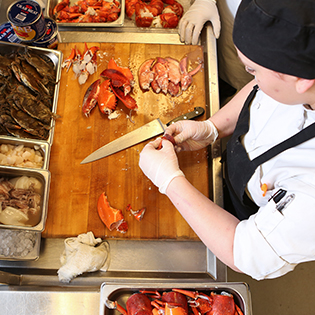
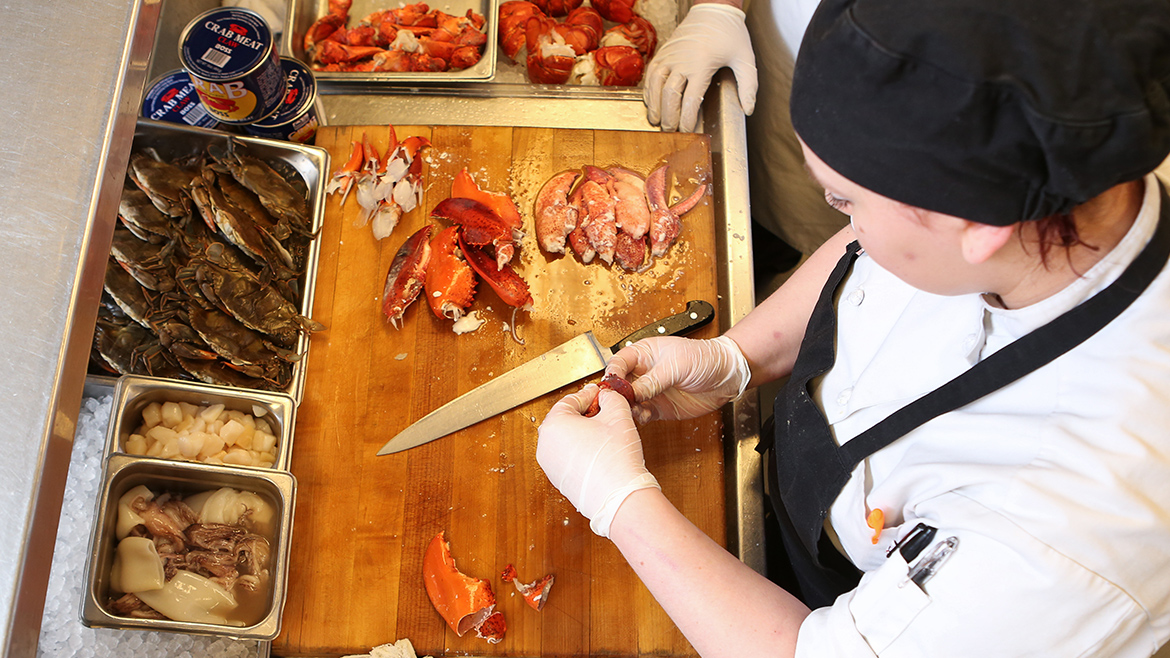 General Manager John LaRocca and Chef Daniel Pliska of the University Club commit to developing future chefs and leaders.
General Manager John LaRocca and Chef Daniel Pliska of the University Club commit to developing future chefs and leaders.
What happens when you take students with an appetite to learn, combine them with a mentor who has a heart to train young people, then toss them into a real-life laboratory to experiment and create? What happens when you allow them to marinate, bringing out their natural skills, then garnish the experience with the credentials needed to further their career path?
Executive Chef Daniel Pliska and General Manager John LaRocca of the University Club hope to garner future chefs and managers who demonstrate the cutting-edge skills and deep passion for their craft that will make a mark on the hospitality field, here in Columbia and beyond.
LaRocca credits his 35 years of success in the hospitality industry to the leaders and mentors who spent time teaching him the trade. He knew it was a value he wanted to pass on when he joined the University Club in 2006.
“My boss encouraged me to run the club like it was my own business,” LaRocca says. “I knew that if I were the owner, I would expect my senior management to give back to the industry and share their knowledge with young people.”
Chef Pliska, who joined the University Club in 1998, shares a similar vision. “This is my 40th year in the kitchen,” he says. “I’m an executive chef. Giving back and training young people is a responsibility.”
Thanks to Pliska and LaRocca, the Club has become known around the university for having a training atmosphere. “We not only provide a service to the university through events,” Pliska says, “but also as an avenue for upcoming chefs to learn.”
Shortly after being hired, both Pliska and LaRocca set to work bringing structured apprenticeship and internship programs to the University Club that would develop the next generation. Today, those two programs are still flourishing, producing the executive chefs and club managers of tomorrow.
Cooking with Chef Pliska
“I like to call it the heart of the house,” Pliska says, walking through the kitchen, pointing out the expansive space. The room itself is utilitarian, with commercial appliances lining the walls. Rows of stainless steel work tables form rows in the center, with pots of all shapes and sizes hanging overhead. Mixing bowls line the shelves and a commercial cooling rack stands ready to handle whatever creation comes out of the oven next.
A few of the club’s 25 to 30 kitchen employees scurry about, some preparing to head home, others peeling potatoes or cutting berries. One of the club’s sous chefs gets Pliska’s attention and asks his advice on a salad his team has prepared for an upcoming tasting. Notes about the day’s events hang on a bulletin board in easy view, and rolls of plastic wrap sit ready to protect the crew’s hard work.
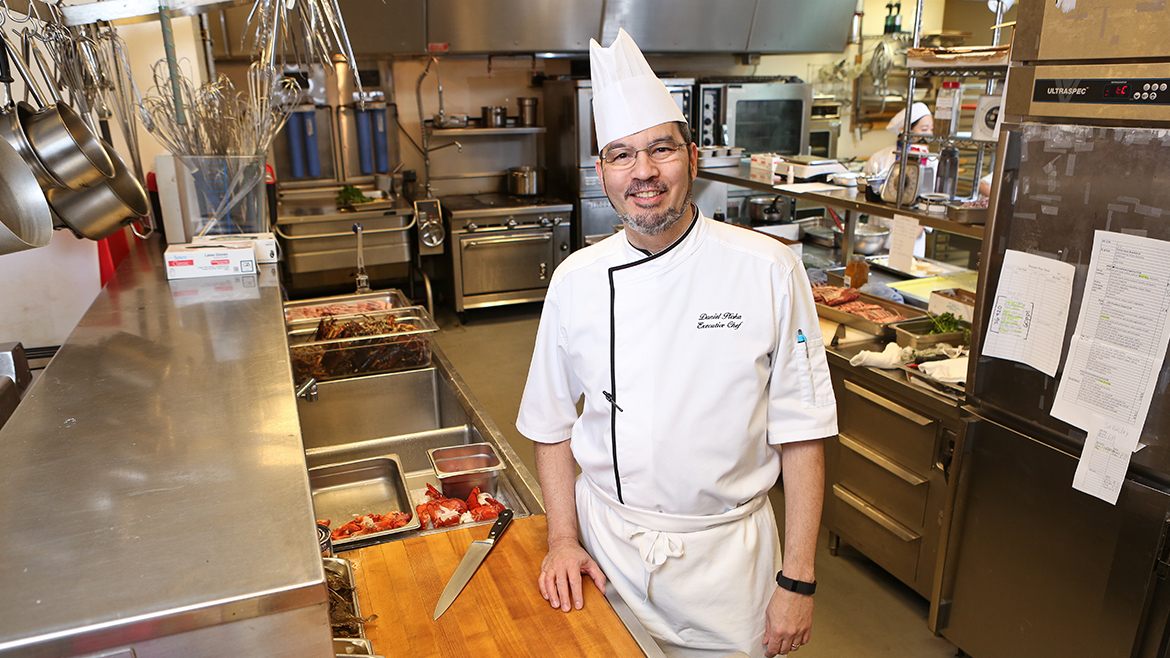
The kitchen at the University Club houses the Chef Apprenticeship Program, a formal culinary training program accredited by the American Culinary Federation and the U.S. Department of Labor. The program is a three-year, 6,000-hour experience for future chefs wanting to combine classroom learning with hands-on experience.
Chef Pliska worked hard to bring the program to the University Club through the ACF local chapter more than 15 years ago, and he considers developing apprentices one of his passions. He is currently the president of the Central Missouri Chef’s Association and was nominated and selected to serve on the ACF National Apprenticeship Committee last year.
Apprentices apply to the program, and if accepted, they are paid to work full-time at the Club for three years while attending classes one day a week at Johnson County Community College, in Overland Park, Kansas. Apprentices learn all 10 stations in the kitchen and keep a log book to document their work and hours. Once they complete the requirements, they receive an associate’s degree in culinary arts from JCCC and a diploma as a certified culinarian from the ACF.
The University Club is currently the only location in central Missouri that offers the apprenticeship, and Pliska says it provides a unique experience as a high-volume, private club. “Cooking isn’t always comfortable,” he explains. “There are lots of challenges and stress, especially with the volume we do. Chefs have to love that and understand it.”
Pliska says being a chef requires the hand skills and dexterity to perform the tasks, knowledge of the theory and an ability to train the palate. In addition, he believes it takes a special kind of person, someone who thrives on the action, to succeed in the fast-paced environment. He describes the profession as grueling, with lots of hours and holidays spent working. “If future chefs can make it here,” he says, “they can make it anywhere.”
Apprentices from the program have gone on to work for Ritz-Carlton and the Bellagio. One former employee began as a dishwasher, became an apprentice, and is now working for an elite restaurant in California. He stopped by the University Club over the holidays to say hello and to thank Pliska and LaRocca for the opportunity that launched his career.
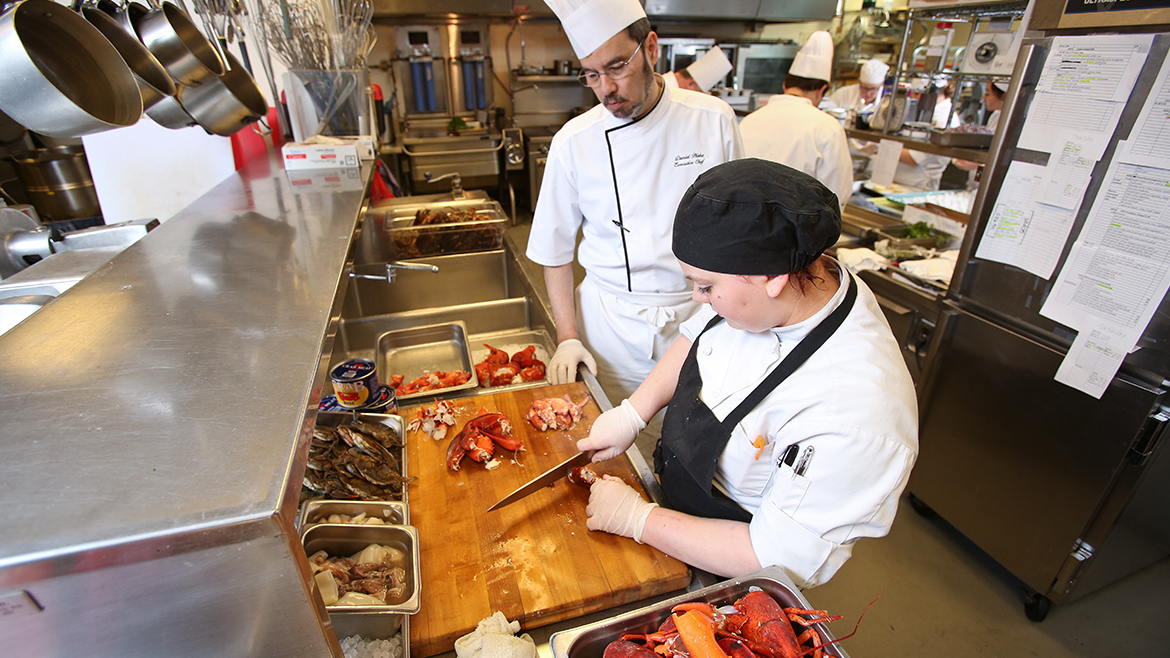
While the ACF only requires that participating houses produce at least 51 percent of their food from scratch, the University Club creates 90 percent of what they serve. This commitment to freshness means that apprentices work with 15 different people or organizations who supply food to the Club and more than 700 individual food products during their tenure. They have rare fish and wild game flown in, learn to make as many as 25 seafood creations, cook with eight to 10 different mushroom species, bake their own bread, and make their own ice cream. All these dishes and more are prepared to provide food for the lunch buffet and as many as 20 functions that the club serves in-house or caters each day.
As part of the program, future chefs learn to cook in three broad areas – hot foods; garde manger (cold foods); and baking and pastries. Each area is then broken down into categories like classical recipes, regional dishes and global influences. Given the vastness of options, Chef Pliska believes becoming a chef takes years of commitment beyond school. “You can become a good cook in three years, a sous chef in five, but it takes 10 years to really become a chef.”
That dedication to the profession is what drives Pliska to train others, like Reed Crull and Natalie Heinrich, to do what he does.
A Hands-On Opportunity
“I realize now that cooking started early in my life,” Apprentice Natalie Heinrich shares. “I would help my mother and grandma in the kitchen, cook dinner, and bake desserts, if I could get away with it.” While a senior at Hickman High School in 2013, her love for food led her to take a culinary class. Getting a taste of French-style cooking sealed the deal, and she was soon learning everything she could and applying for a job at the University Club.
After working for a year in the kitchen, Heinrich knew she was ready to formalize her career as a chef. Pliska introduced her to the apprenticeship program, and she liked the idea of learning hands-on in a kitchen while pursuing her degree. “I learn something new every day, thanks to the employees in the kitchen,” she says. “They want to see me succeed and progress in what I do.”
Reed Crull decided to be a chef after spending time in a kitchen as well. “I liked the environment — the constant push, the excitement and the gratification at the end of a hard day,” he says. Crull’s desire led him to enroll in the apprenticeship program in 2009, where he hoped to grow significantly in his cooking abilities and techniques.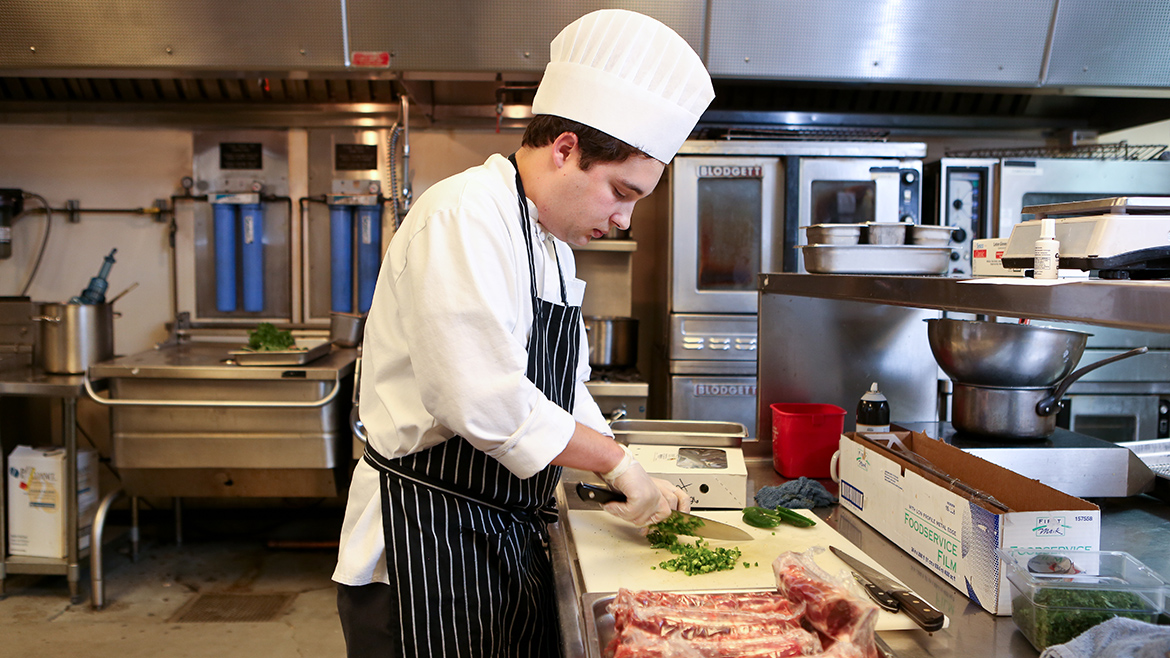
Yet Crull says the apprenticeship went beyond improving his cooking and baking skills. He was able to gain real-life experience in management, food cost, communication and leadership, all at a fraction of the cost of a large culinary school.
“The program also motivated me to learn more,” Crull shares. “That motivation, combined with our chefs having high expectations of apprentices, really pushed me to excel.”
During his time as an apprentice, Crull enjoyed exercising his creativity, coming up with specials and new menu items. “One big benefit to this program was being able to read about something, take that information to work, and execute the dish or technique with well-trained chefs.”
Crull graduated in 2013, received his certification, and continued working at the University Club as a sous chef alongside Chef Pliska. “I knew there wasn’t another place in town that would allow me to do and learn as much as I can here,” Crull says. As a sous chef, Crull now joins Pliska in training new apprentices, like Heinrich.
The learning atmosphere found in the kitchen extends throughout the rest of the house as well.
Managing with John LaRocca
LaRocca admits to being confused when he took the job as general manager of the University Club ten years ago and realized there was no collaboration between the formal programs of the University and the real-life experience available at the Club. “We’ve got a living lab here,” LaRocca says, gesturing around the entryway to the Donald W. Reynolds Alumni and Visitor Center. “We have such an opportunity to enhance our students’ education and share our experience.”
It was that spirit that led LaRocca to contact the College of Agriculture, Food and Natural Resources shortly after his arrival. “We met, I put a proposal together, and within a few days the ball started rolling,” LaRocca shares. What resulted was a cooperative internship opportunity between the MU Hospitality Management Program, a department of CAFNR, and the University Club that is open to students of any grade level who are enrolled in the program.
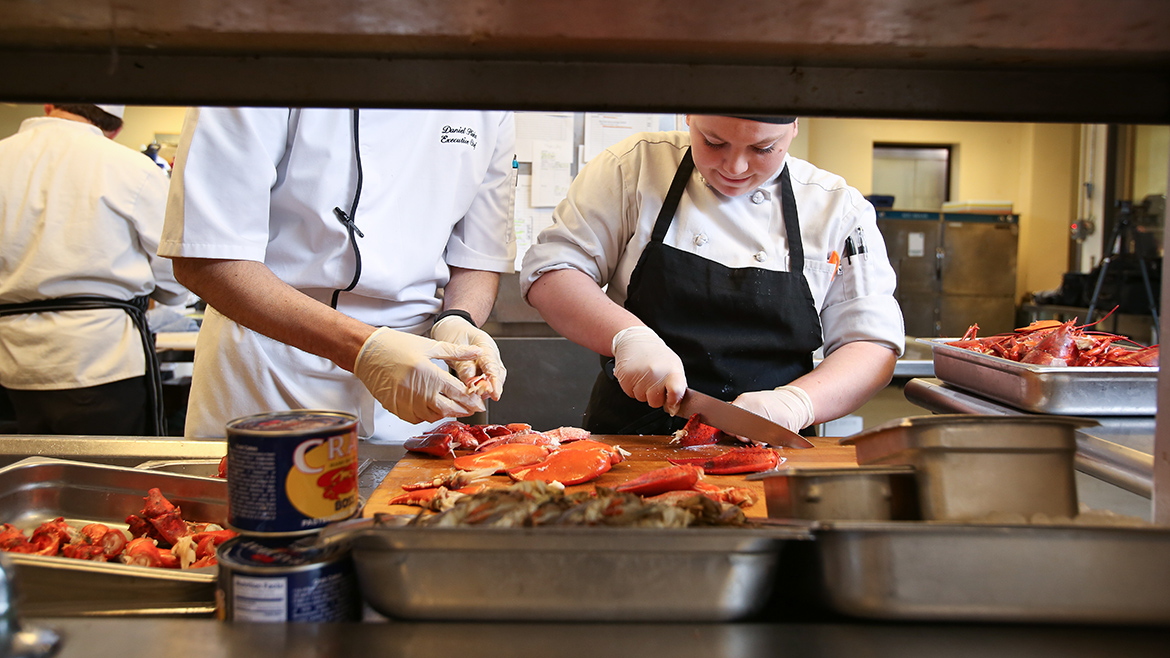 Those students interested in participating apply for the internship and go through an interview process, but only a handful are selected. LaRocca says no experience is necessary — he is willing to train anyone — but interns do need to exhibit an insatiable desire to learn and have an understanding of the demanding hours the hospitality profession entails.
Those students interested in participating apply for the internship and go through an interview process, but only a handful are selected. LaRocca says no experience is necessary — he is willing to train anyone — but interns do need to exhibit an insatiable desire to learn and have an understanding of the demanding hours the hospitality profession entails.
Once accepted, interns work 15 to 20 hours each week for two semesters. During the first semester, they spend two to three weeks rotating through each of the Club’s departments, including banquets, dining room, culinary, catering, sales and event planning. The second semester is concentrated in one specific department, and interns are asked to identify their top choices beforehand. Not only do they receive a salary for their work, but they also earn three credit hours each semester for the experience.
“We are really moving the students along,” LaRocca says, “turning them into supervisors before they leave.” Besides performing basic functions in order to understand each department, interns are also exposed to more advanced tasks, like budgeting, forecasting and managing.
LaRocca revels in the chance to help them excel. He, like Chef Pliska, realizes the University Club is a unique environment that offers interns a variety of opportunities to learn. “Interns get to experience finer dining, finer foods, finer wines and proper etiquette,” LaRocca shares, “because that’s what we do.”
Interns also experience a large quantity of events and the chance to work on a staff of 75 to 175. On a typical football weekend, LaRocca says the Club will feed 2,000 to 3,000 people off-site through brunches, tailgates and alumni group events, with an additional 10 to 15 banquets served on-site at the alumni center. The weekend that Mizzou football played Georgia, the Club fed 1,100 Bulldogs for one alumni party.
“I call it controlled chaos,” LaRocca says with a laugh. And he’s glad to give students the chance to experience a high-volume private club while they’re still in school. Annie Storey is one of those students.
An Eye-Opening Experience
Storey will graduate in May with a degree in hospitality management and a dual emphasis in conference and event planning as well as lodging. She heard about the internship program at the University Club when LaRocca came and spoke to one of her hospitality classes last March. She started in the program this past fall.
“One of my favorite aspects of this internship is how hands-on it has allowed me to be,” Storey shares. Her first week, she was asked to take charge of an awards dinner for the provost’s office. The experience gave her insight into how much work, energy and attention to detail go into planning a successful event. “I got to see every step of the process from beginning to end and had a lot of fun doing it,” she says.
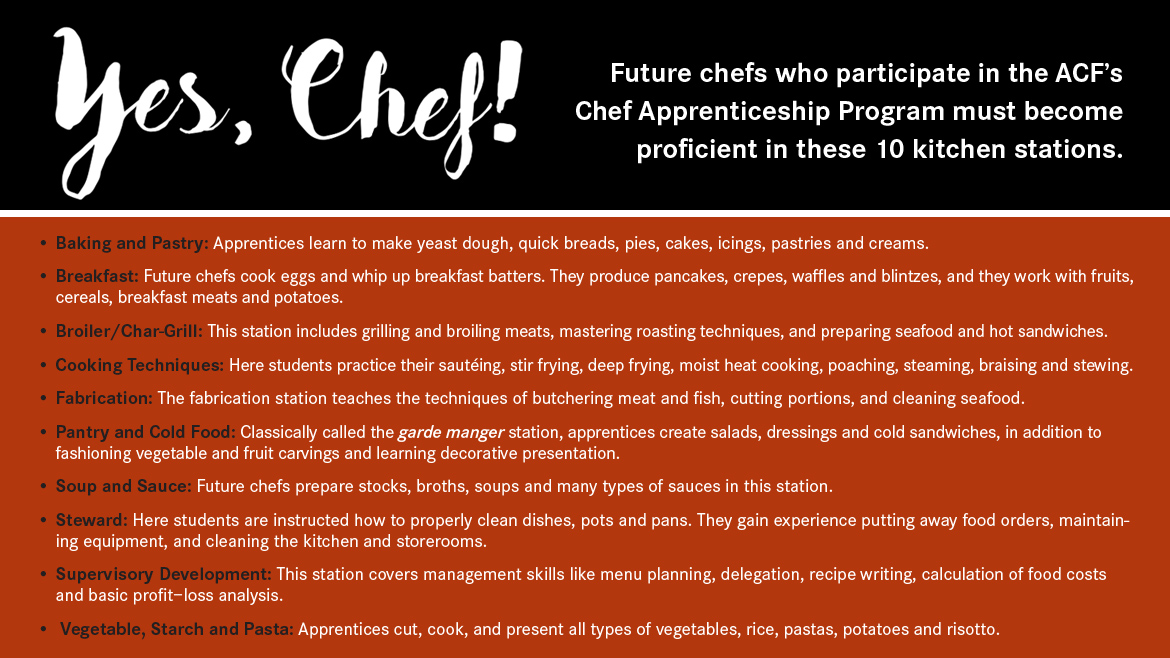
Storey chose the internship program to supplement her education because she knew the University Club would offer an exceptional opportunity to learn about sales and event planning from the inside of a large-scale, successful business. “The sales and event planning internship is competitive,” Storey shares, “so I am very lucky that I was selected this year.” She is also grateful to be surrounded by the “amazing” people she works with at the University Club.
So far, Storey says the internship has taught her valuable skills in paying attention to detail, working with many types of people and coordinating with other departments. “I’ve learned firsthand that the success of an event depends on many different people working together, including event, kitchen and service staff,” she says. She also appreciates that the program allows her to work with events as large as 3,000 people or as intimate as 30.
A Winning Combination
Phil Dreshfield, an instructor in the food and beverage track of the Hospitality Management program, knows a gem when he sees it. Dreshfield is in his third semester as an instructor and enjoys the collaboration he experiences working with Pliska and LaRocca. “Chef is an excellent teacher,” he says, “so we are always trying to identify students in the culinary tract and push them in the direction of the University Club.”
Dreshfield says he can teach a certain amount of competence in his classes, but he can’t drill down to the level of mastery that Pliska and LaRocca can. “These programs really give the apprentices and interns a chance to hone their specific skill set.”
Both programs are a wonderful opportunity for students, Dreshfield says, a good compliment to what he does in the hospitality management program and an asset to the industry. “Pliska and LaRocca understand the drive behind students wanting to pursue positions in the hospitality industry as their preferred career path, not as a stepping stone to something else,” he says. “They are naturals at getting students from Point A to Point B, no matter what program or route they choose.”


